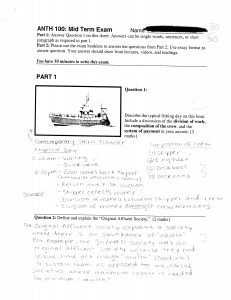Students often ask me if it is possible to score a perfect test result. I will usually say “yes, but it’s not often.” This mid-term we had two scores of 30/30 and a significant number of exam marks 25/30 and higher. As I explained on Friday, when I personally handed out your mid-terms to each student who was present in tutorial, the exam average was 21/30 with a standard deviation (SD) of +/-4. Thus, 2/3rds of the exam scores ranged from 17 to 25. This is a very good outcome for a first year course, in fact the mid-term average is slightly higher then the norm which would more likely have been 18 or 19 out of 30 with a narrower SD of +/-3. I draw this conclusion from about 10 variations of the course that I have taught over the past 15 odd years. So, the overall conclusion is that the mid-term results this year were very good.
I know that there will be students who feel disappointed with their mid-term. A few students may even believe that errors have been made in the marking, while other students will feel depressed and sad about how they may have failed themselves. Either way I say don’t despair. It’s best to fail earlier, harder, and when it doesn’t really count – learn from your failure (whether your fail was 14/30 or 22/30 or . . . ). Perspective is everything. For those students who did not pass or just passed you have an option of making an appointment with me for an oral assessment. If you can demonstrate an understanding of the course material I will revise your grade to 16/30.
Any student who wishes to talk about their exam please make a point of speaking with your teaching assistants and/or me. If you note errors of addition please bring them to our attention.
A colleague in physics at UBC uses a sports metaphor to help his students think about exam results. Imagine that you just played what you through was your soccer game to win – but you lost, lost badly. “Don’t,” he said, “yell at the ref!” Take a moment and think about the game. Go off to the locker room with your team and self assess. What did we do right? What mistakes did we make? What more could we have done? His point, and one that I agree with, is that your first step is to review your exam and how you answered it.
The first step of your review is to look at the questions, your answers, and the notes that you have taken in class and while you were preparing for the exam. Once you have done that ask fellow class members how they answered specific questions. Be warned – there will be variations in the type of answers. You might find this confusing at first, but think about the different answers and consider how yours is different. (To aid in your comparison I have posted below one of the exams that was marked 30/30 for your reference.) Once you have reviewed all of these different sources of information rewrite your own answers. Supplement your answers by adding material from your notes, readings, and the other exams you have reviewed.
Finally, congratulation to everyone who turned up and wrote your exam. That is an important act of self-respect. Sometimes people find it hard to face an exam. Just doing it is, as far as I am concerned, a form of success.


